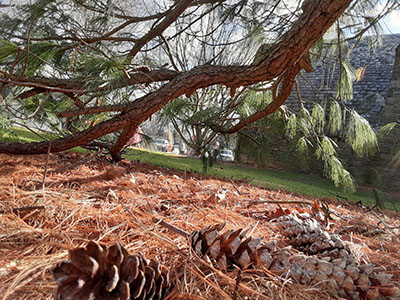
Plants of the Week: Jan. 25

Evergreen foliage and ornamental bark are two features I could never be without in the winter garden. It’s only natural that these features take center stage in the leafless months.
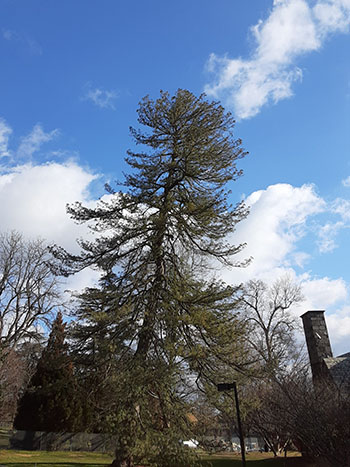
The form of Pinus wallichianan is a bit unpredictable, but somewhat similar to the common U.S. East Coast native, Pinus strobus (Eastern white pine). photo credit: R. Payne-Meyer
An engaging evergreen is the Himalayan pine, Pinus wallichiana. This montane pine is adorned with long, bluish-green, soft droopy needles – an absolute joy to my eye. The form of this pine is a bit unpredictable, but somewhat similar to the common U.S. East Coast native, Pinus strobus (Eastern white pine). Cones are dark brown, long and slender, a perfect match for the foliage. P. wallichiana trees have a squat appearance in youth and a tall, slender form in maturity. Mature trees sited in a sunny spot will retain their lower branches, a trait uncommon among pines.
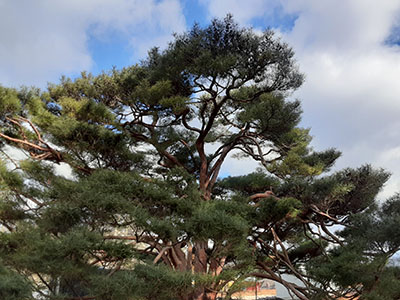
Highly whimsical and equally dignified, this shrubby, slow-growing variety of P. densiflora, P. ‘Umbraculifera’ is quite the charmer in older age. photo credit: R. Payne-Meyer
Another top-shelf pine is Pinus densiflora ‘Umbraculifera’, the Tanyosho pine. Highly whimsical and equally dignified, this shrubby, slow-growing variety of P. densiflora is quite the charmer in older age. Fiery red-orange bark is showcased by dense upright growth, concentrated towards the top of the plant. Mature trees often develop a skewed flat top and twisted branches. The overall appearance of this pine is coarse. P. densiflora ‘Umbraculifera’ is well suited in meadows, rock gardens, Asian gardens, or as an open-grown specimen in the lawn. The P. densiflora species is native to Japan, the Korean Peninsula and northeastern China.
Less tidy and formal than most conifers, pines often have eccentric features – great for making a statement in the landscape. A flat top and tiered habit are common sights on mature pines; Features like these make pines well suited as unaccompanied specimen trees.
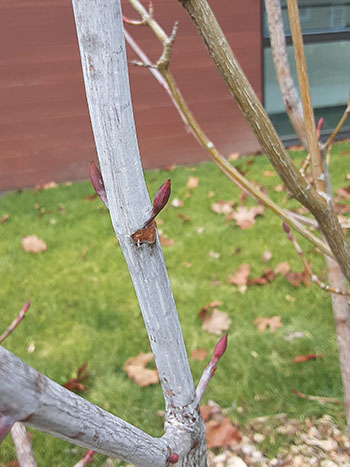
Another tree with vivid bark is Acer tegmentosum ‘Joe Witt’, the Manchu striped maple. photo credit: R. Payne-Meyer
Another tree with vivid bark is Acer tegmentosum, the Manchu striped maple (not to be confused with Manchurian maple, Acer mandshuricum). The green-yellow bark of this maple is decorated with vertical white stripes. Like many striped maples, the bark is more colorful during the winter months. The white striping is more notable on the tips of young branches.
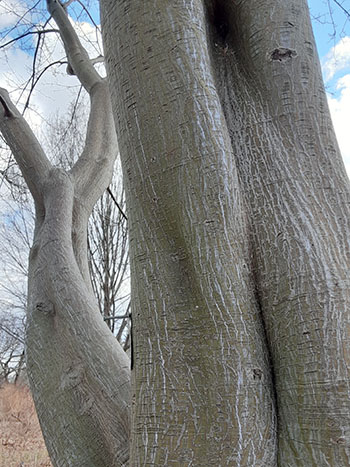
Acer ‘White Tigress’ also boasts impressive white striping and is considered one of the most heat tolerant striped maples. photo credit: R. Payne-Meyer
Two notable selections of A. tegmentosum are ‘Joe Witt’ and ‘White Tigress’, the latter often considered a hybrid with A. davidii (David maple). A. tegemenosum ‘Joe Witt’ has exceptional white coloration, so much so that young plants may appear almost completely white. Acer ‘White Tigress’ also boasts impressive white striping and is considered one of the most heat tolerant striped maples. The ghostly effect of these trees is made better yet by an evergreen backdrop.
Celebrate the brisk days of winter with evergreen foliage and textured bark in the garden.





No Comments